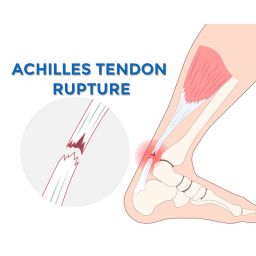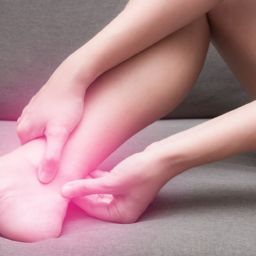
If the lower half of your calf hurts, you’re not alone. Over 200,000 people visit a doctor every year due to Achilles heel pain. While the Achilles tendon is very strong, it is not very flexible. When it is stretched too far the tendon can become inflamed, which is known as Achilles tendonitis, or it can tear. Sometimes, the pain associated with these conditions is minimal and can be relieved with at-home treatments. Other times, it is severe and requires a visit to your podiatrist to receive Achilles tendon pain treatment.
When to Seek Treatment for your Achilles Tendon Pain
You should seek treatment for your Achilles tendonitis or tear when the pain significantly impacts your life. This includes situations where the pain lasts for more than a day, or if your lower leg hurts while you are not using it. You should also make an appointment with your podiatrist if you notice your Achilles tendon or heel is swollen.
It’s important to seek pain treatment for your Achilles tendon as soon as possible to prevent the condition from getting worse. Ignoring the problem could make it worse, eventually leading to more aggressive treatments or the need for surgery.
Causes of Achilles Heel Pain
Like many tissues in your body, the Achilles tendon gets worn out as you age. If you maintain the same level of activity on a regular basis — going for a daily walk, for instance — this shouldn’t be a problem. If, however, you put extra strain on your Achilles or abruptly change your exercise routine, you could injure your tendon. Repeatedly pushing past the pain can lead to breakage, which may require surgery.
Men are more likely than women to require treatment for an Achilles tendon condition. Additionally, cold weather, bad shoes, and high blood pressure can all increase the likelihood of experiencing Achilles tendon.
Achilles Tendon Injuries
Several injuries can affect the Achilles tendon, ranging from mild to severe. Here are some common Achilles tendon injuries:
- Achilles Tendinitis:This is inflammation of the Achilles tendon, often caused by overuse or repetitive stress. It can lead to pain, swelling, and stiffness in the back of the ankle.
- Achilles Tendinosis: Unlike tendinitis, tendinosis involves degeneration of the tendon tissue due to chronic overuse. It can result in pain, weakness, and a thickening of the tendon.
- Achilles Tendon Rupture: A rupture occurs when the Achilles tendon tears partially or completely. It can happen suddenly during activities like jumping or sprinting, causing sharp pain, swelling, and difficulty walking.
- Insertional Achilles Tendinopathy: This condition affects the area where the tendon attaches to the heel bone. It can cause pain, swelling, and tenderness at the back of the heel.
- Paratenonitis: This is inflammation of the tissue surrounding the Achilles tendon, known as the paratenon. It can cause pain, swelling, and a “creaking” sensation during movement.
- Achilles Bursitis: Bursitis occurs when the bursa, a fluid-filled sac that cushions the tendon, becomes inflamed. It can result in pain, swelling, and tenderness at the back of the ankle.
These injuries can vary in severity and may require different treatments ranging from rest, ice, and physical therapy to surgery in more severe cases like ruptures. Timely identification and proper treatment are essential for achieving the best possible recovery outcomes and avoiding potential long-term complications.
Achilles Tendonitis Treatment Options
What sort of treatment you need will vary based on the severity of your pain. In some situations, you simply need to rest the affected foot. Ice and elevation may also be used to ameliorate the pain you are experiencing, and the resting time will allow your lower leg to heal by itself. You should start slowly once you feel ready to return to your normal exercise schedule. Carefully ramping up the level of strain you put on your Achilles heel will help prevent future issues.
A doctor may recommend extra measures to ensure you do not put strain on your already weakened tendon. This can be done with night splints, a cast, or anti-inflammatory medication. In some situations, physical therapy can also help strengthen your tendon.
Chronic Achilles tendinitis has traditionally been a very difficult problem to overcome. Fortunately, regenerative medicine techniques have changed the game when it comes to treating these conditions. Amniotic fluid injections are able to drastically reduce inflammation, reduce scar tissue formation, and accelerate the healing of tendon tissue in a fraction of the amount of time previously required.
Recovering from Achilles Tendonitis
Achilles tendon injuries can be challenging and require careful management for successful recovery. The Achilles tendon, the largest tendon in the body, is crucial for walking, running, and jumping, making its healing process crucial for restoring mobility and function.
Recovery from an Achilles tendon injury typically involves a combination of rest, physical therapy, and sometimes surgery. Initially, the focus is on reducing pain and inflammation through rest, ice, compression, and elevation (RICE). This helps to control swelling and promote healing in the early stages.
Physical therapy plays a vital role in Achilles tendon recovery. Therapists use a variety of techniques to strengthen the tendon and surrounding muscles, improve flexibility, and restore normal gait patterns. Exercises may include calf stretches, heel raises, and eccentric strengthening to gradually rebuild the tendon’s strength and resilience.
In some cases, especially severe injuries or those that don’t respond to conservative treatments, surgery may be necessary. Surgical repair involves suturing the torn tendon and may require a period of immobilization followed by rehabilitation.
Regardless of the treatment approach, Achilles tendon recovery is a gradual process that requires patience and adherence to the prescribed rehabilitation plan. With proper care and guidance from healthcare professionals, most individuals can regain function and return to their normal activities over time.
Conclusion
If, however, you are suffering from severe pain, your Achilles heel may be broken or ruptured. You will need a consultation with a certified specialist to determine which surgical option is right for your individual case.
At Certified Foot and Ankle Specialists, we have vast experience diagnosing the source of your heel pain and administering treatment for your injured Achilles tendon, whether it is conservative or surgical. To schedule a consultation to help you resolve your Achilles tendon pain, contact us at (855) 687-3281.




